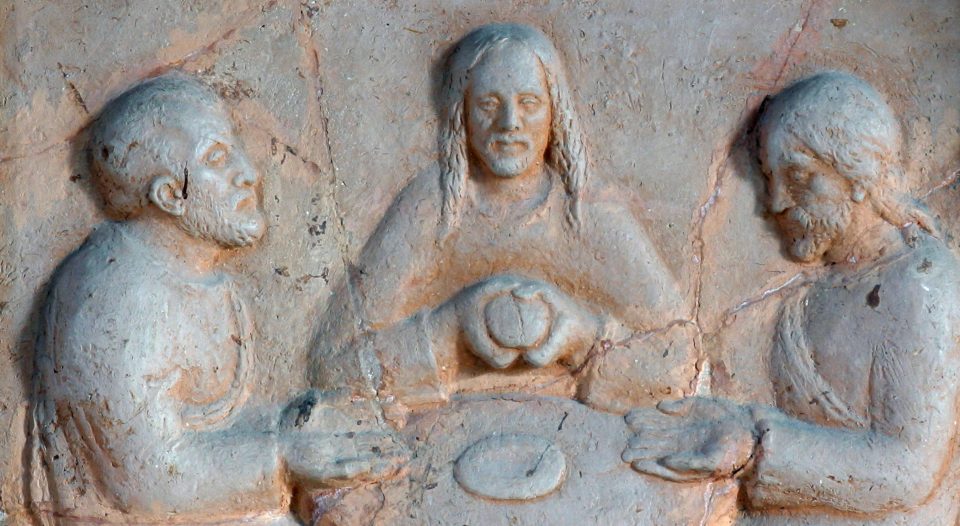Lectionary for April 23, 2023
Third Sunday of Easter
Acts 2:14a, 36-41; Psalm 116:1-4, 12-19;
1 Peter 1:17-23; Luke 24:13-35
Matthew is my favorite Gospel, as longtime readers know. And we do read mostly from this Gospel during Year A of the lectionary. But there is something terrific about getting to read Luke and Acts together during the season of Easter. This two-part work by the same author portrays a developing sensibility about who Jesus is and what he came to accomplish. The transition from Jesus’ earthly ministry to the Spirit’s ministry is profoundly important both for doctrine and as a model for the life of the church, congregations and individuals. In this week’s passages we see, even in the days and weeks after the Resurrection, how ideas about Jesus develop.
Only three days after Jesus’ crucifixion, some of his disciples are walking in the countryside around Jerusalem. Suddenly Jesus is walking with them, though they aren’t permitted to recognize him. Scholars think these were long-term disciples who may have been Jesus’ extended family members from Nazareth. They certainly would have recognized Jesus if not given temporary spiritual blindness.
While they don’t recognize Jesus himself, they are given an extended lesson on recognizing the person and role of the Messiah. The walkers confess to Jesus freely that their crucified master had been a prophet mighty in deed and word in the sight of God and all the people. Indeed, Jesus is a prophet in the classic and popular sense: he spoke the words God gave to him but also foretold future events. No one, apparently, disputed Jesus’ words and deeds of power, which some found dangerous while others found them comforting.
The walkers had also hoped that Jesus would be the one to redeem Israel, though their hopes were dashed. We need to be honest that Jesus, neither before his crucifixion nor after his resurrection, redeemed Israel, at least not in the ways people had hoped. They had expected something on par with God redeeming Israel from Egypt and Babylon. Jesus was one of hundreds of thousands of Jews tortured and killed by the evil Roman Empire. Jerusalem fell (and was taken again) long before Rome also fell. If the Psalms tell us anything, it’s that God can handle our complaints, disappointments and lamentations. The lament of Jesus’ followers over their crushed hopes that he would redeem them in a physical, political way from under the boot of Rome must not be dismissed.
It was only while celebrating the breaking of bread that they recognize Jesus. Jesus is the master of the feast, who is both host and meal.
Their crushed hopes notwithstanding, Jesus—still unrecognized—gives the travelers an extended Bible study, applying passages from the writings of Moses and the prophets to the life and work of the Messiah. This is who Jesus claims to be: God’s anointed one who would accomplish God’s rescue mission, not from the power of Rome but from the powers of sin and death.
After journeying together and hearing Jesus teach at length, his disciples are still prevented from recognizing him. It was only while celebrating the breaking of bread that they recognize Jesus. Jesus is the master of the feast, who is both host and meal. As he offered the bread, the disciples were no doubt reminded of how, only a few days before, Jesus had given them bread, saying that it was his body, given for them.
About 50 days later, Peter gives a speech to Jews gathered to celebrate the ancient pilgrimage festival of Shavuot/Pentecost. Peter nears the end of his speech by proclaiming that God had made the man Jesus both the Messiah and Lord. These weren’t new claims for Peter, but they would have been radically new for many of those hearing about the crucified and resurrected Jesus for the first time. Peter was fully convinced that Jesus, even before his crucifixion, was God’s anointed one, though he probably didn’t understand the entirety of what Jesus was anointed to do. Whatever else, Jesus was Peter’s lord. This term is probably best understood as “master,” not the equivalent of the divine name, though some will disagree. In every way that mattered, Peter was calling on other Jewish pilgrims to recognize what he knew: God had made Jesus into the anointed savior and heir to David’s eternal throne.
In addition to that identity of the anointed savior, Peter also testified to another role: the grantor/guarantor of the Spirit. To be baptized in the name of Jesus (probably the second or third ritual/religious washing in as many days for most of Peter’s audience who had been entering the temple grounds) would invite the Spirit’s presence into their lives.
In Luke and Acts, across the span of just a few weeks, Jesus’ followers came to understand more about who Jesus was (and wasn’t). During this season, may we join them and come to know Jesus better.




